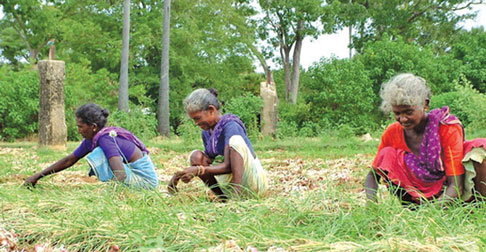Drought hits agriculture sector
By Gamini WARUSHAMANA
Sri Lanka may suffer the negative impact of climate change this year
as the north- west monsoon rain has delayed. The drought continuing in
most parts of the country hashit the agricultural sector.
The prevailing drought has affected paddy, vegetable and other food
cultivation and as a result vegetable prices have increased sharply.
Traders said that supplies from all major cultivation areas have
dropped.
 The Ministry of Irrigation said that around 26,298 hectares of paddy
cultivation will be destroyed by drought this Yala season. The Ministry of Irrigation said that around 26,298 hectares of paddy
cultivation will be destroyed by drought this Yala season.
The Ministry said that farmers faced this calamity as they have not
followed instructions given by irrigation officials.
They had instructed farmers to limit paddy cultivation to 40 percent
and plant other crops instead, considering the water levels dropping in
all reservoirs. But farmers have cultivated paddy and now there is no
water to be released.
However, Director General of the Department of Agriculture,
K.G.Sriyapala was optimistic that the drought may not affect paddy
cultivation to create a shortage in rice.
The plantation sector too has felt the impact and specially tea
production this year will decline, sources said. Senior Research Officer
of the Tea Research Institute, Dr.M.A.Wijerathne said that tea
plantations in all parts of the country have been affected by drought
and the yield will decline as a result.
Assistant Manager of Alton estate Up Hot, Hatton, Dilroy Manohar said
that tea yield has dropped by around 50 kg/ he. The usual heavy rains
have not come this monsoon season and only occasional showers around 1-2
mm were experienced in the past few months. The monsoon rain has not
started as yet and therefore planting and applying fertiliser has
delayed, he said.
Another sector that causes a serious threat on the economy is
electricity generation. CEB officials said that water levels in all
reservoirs have dropped to 24 percent of 1259 GWH total capacity. The
remaining capacity cannot be used and they should be shared with
agriculture and drinking water needs as well, they said. As a result the
CEB has to shift to high cost thermal power generation.
This situation will further reduce economic growth this year .
Recently the IMF said that economic growth this year will be around 6.7
percent. Earlier it had forecast 7.2 percent growth. The Government has
identified the negative impact of climate change as an inevitable
challenge in economic development. This has been emphasised in the
Annual Report of the Ministry of Finance released last month.
According to statistics of the meteorological department, global
warming has affected Sri Lanka. During the last 22- years, Sri Lanka's
air temperature has increased by 0.45 C and it is equal to 0.2 C
increase per decade. As a result consecutive dry days and the number of
warm days and warm nights have increased while cold days and cold nights
have reduced.
Rainfall too has been declining over last 30-40 years and the trend
is towards one- day heavy rainfall event. Under these climate
conditions, vulnerability of crops such as rice, vegetables and other
food crops is increasing and the livelihood of 1.8 million people is
under risk.
|

